Workshops
The Bachelor of Arts (Fine Art) moved to a two-stage enrolment process in 2018. In stage one, you will have enrolled online in courses for semesters one and two 2018. In stage two, you will now need to select semester two 2018 classes for your Workshop.
This page will assist you with stage two of the enrolment process. Here you will find a list of potential semester two Workshop classes. You will only take one Workshop class in semester two, but you need to list three (3) preferences. These workshops will be for both first and second year students and will be offered under the following course codes:
Workshop 2 VART 3650 (1st year students)
Workshop 4 VART 3652 (2nd year students)
Read the list below carefully and select three Workshop classes you would be happy to enrol in for semester two. Remember these Workshop classes are 12 credit point courses and will require 3 contact hours per week.
In May 2018, we will post a link to a Google form on this page so that you can nominate your preferred Workshop classes. The form will have three (3) drop-down menus with the following classes listed. You will need to nominate your first, second and third Workshop class preferences.
For more information about a course, please contact the Studio Lead of the offering studio.
IMPORTANT – You must not repeat any class in your preference lists. Every effort will be made to place you in your first preference classes.
Course Information
Offering Studio & Studio Lead
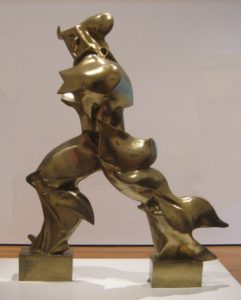
Unique Forms of Continuity in Space, 1913 bronze by Umberto Boccioni
Bronze Foundry - FULL
In this course you will develop practical skills across a range of processes and materials which are commonly used in sculpture practice. You will be introduced to particular methods and materials through specific projects, with an emphasis on the relation to individual concepts in art making. Some of these include; lost wax casting (bronze and aluminium), fabrication in metal and timber, pattern making. You will be given practical instruction and experience in the use of workshop equipment together with relevant health and safety training. The course is mainly practical but with appropriate tutorial presentations covering theoretical and relevant historical background.
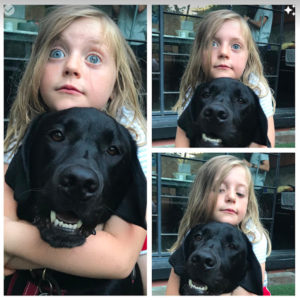
Ben Sheppard, 2018, photograph
Concepts of Representation - UNAVAILABLE
In this course you will examine a range of ideas and practices relating to modes of representation and ways of seeing in a local and global context. Linking theory to practice, this course will develop your formal and conceptual understanding of varying modes of representation through your knowledge and application of these fundamental ideas as they emerge. You will be encouraged to reflect on this as a primary point of investigation via a selection of art practices within modernism, postmodernism, and the contemporary. The objectives of this course are to understand how knowledge and making are linked through ways of seeing, and thinking through making. You will make creative works and relate critical concepts, texts and practices to your studio production.
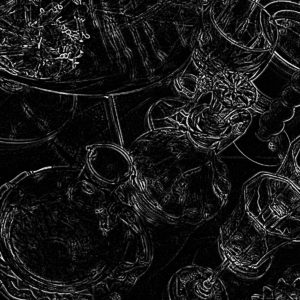
Irene Barberis, charcoal on paper (detail)
Drawing and Perception
This course offers you a structured program in drawing techniques, refinement of general drawing skills and approaches to seeing and perception. It encompasses life drawing and general drawing including aspects of the figure, perspective, pictorial composition and the investigation of self and personal vision. You will produce a folio of resolved drawings with a support folio of studies and research material that are relevant to a range of areas of study. You will examine formal conventions of drawing, historical contexts and its capacity to communicate expressively across a range of media.
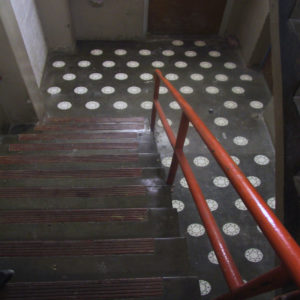
Anonymous, student work
Environments & Spatial Drawing - UNAVAILABLE
In this course you will focus upon the drawing processes artists employ to develop their ideas in relation to the spaces and places we inhabit. You will develop practical drawing-based processes to investigate particular spatial environments and actual locations and strategies to develop these as studio and installation projects. Following teacher directed studio projects you will develop an individual project in relation to site and explore your own art making in relation to drawing practice.
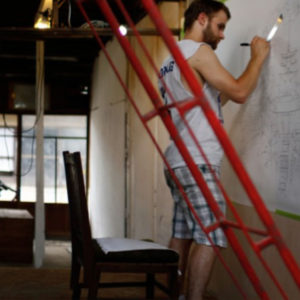
Student on site, Tammy Hulbert
Internship
Internship is a workshop class where you will participate in a placement within an arts or cultural organisation, company, festival, gallery, museum or studio. Placements with industry are considered a ‘self placement’ and arranged through dual negotiation with a host organisation and School of Art. This means you source, initiate, contact and negotiate your placement with a potential host.
If you are considering this workshop, have an idea of who or where you might like to complete a placement. You will need to begin arranging your placement in the first few weeks of the semester, some early preparation will be of great assistance.
You will be expected to work as directed by the host organisation and engage with an arts industry workplace environment over the course of 42 hours. You will need to reflect on what skills and experiences you which to undertake whilst on your placement.
The Internship class is open to all second and third year students. You will only be able to take this class once during the course of your program and therefore the assessment is the same for both second and third year students. The focus is on providing you with a work integrated learning(WIL) experience in which your knowledge and skills will be applied and assessed in a real workplace context and where feedback from industry and/ or community is integral to your experience.
Your 'out of university' time is complimented by four workshops which support your professional development and assist you with the formality of your internship placement. There are two assessed assignment requirements for this workshop.
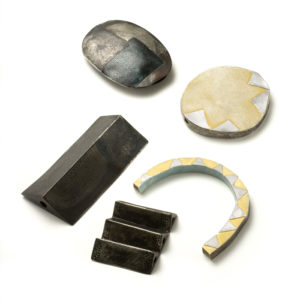
Katherine Bowman, A Found Thing, Hero pendants sterling silver, enamel paint
Jewellery Multiples & Editions - FULL
In this course students will explore fabrication and multiplication techniques for the jewellery object. The technical and physical properties of a range of digital and analogue processes and materials will be used to create small editions of work. Multiplication strategies will focus on building contemporary three-dimensional jewellery and objects. This course will advance jewellery skills to develop conceptual, perceptual, formal and aesthetic concerns as related to the multiple and the edition in jewellery.
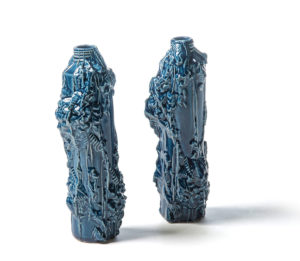
Anni Hagberg, 2017, Porcelain, 30 x 7cm diam
Moulding Objects - UNAVAILABLE
In this course you will explore and experiment with the physical properties of a broad range of materials and learn to perform moulding skills and processes which can be applied to making objects out of a range of materials, including ceramics, paper and wax. Conceptual, perceptual, formal and aesthetic concerns will be addressed as they relate to object making and assist you to develop an individual approach to object forming using moulding processes.
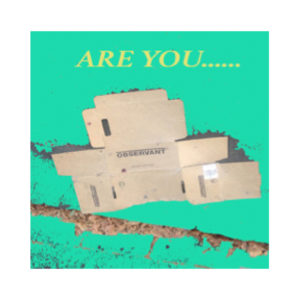
Phil Edwards, Collage
Painting the Everyday - FULL
In this workshop, you will experience how artists use, re assemble and respond to found materials and concepts from the experience of everyday life. This workshop course aims to explore how the observation of everyday objects, in particular miniscule (very small) objects, can be used as a starting point for the making of art. You will be asked to collect, photograph and assemble objects chosen from domestic environments, $2.00 shops, discarded materials and elsewhere in order to develop an expanded painting practice using a variety of media, techniques and conceptual concerns. It is envisaged that from the humble beginnings and roles of the everyday objects chosen, a significant series of works on paper and other supports, will be developed using combinations of painterly representation, abstraction, and collage. Media used will include photographs, charcoal, pencil, ink, crayon, watercolour, acrylic paint, oil paint and digital media. It is envisaged that a change in direction of making will occur frequently. You will develop a personal project in consultation with the lecturer. This workshop aims to extend your skills in making art through innovation, experimentation and visual play. The workshop is complemented by visual lectures, supportive tutorials and feedback and a group collaborative exhibition.
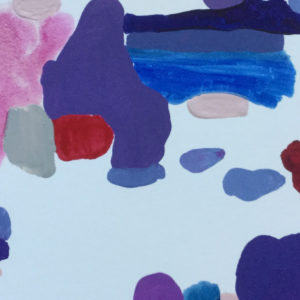
Robin Kingston, Untitled Study (detail), 2017, oil on gesso on paper, 25 x 35cm
Painting, Concepts and Practice - FULL
This course extends upon the concepts, materials and process of painting and related practices of drawing, installation and the object. You will experience a wide range of materials and production processes to create artworks relating to painting with an emphasis on experimentation, conceptual development and studio research. The course is structured through generalised thematic projects and advanced individual self-directed projects. You will experiment with materiality, colour, surface, scale, texture, gesture, images, chance, pattern, repetition and working in series. There will be a focus on abstraction and figurative modes of expression. Themes in contemporary art will be investigated to demonstrate how artists initiate, expand and maximize outputs through experimentation and research. Individual and group tutorials, discussion and feedback sessions, studio demonstrations and studio health and safety complement this painting workshop.
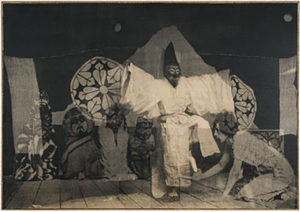
David Noonan, Two Moons, 2009-10
Photographic Screen Printing
This course will introduce you to screenprinting processes and technologies that focus on photographic and text based printing. The objectives of the course are to provide you with the skills and knowledge to: produce photographic screenprints; reflect upon the role of photographic screenprinting in contemporary art; and expand the aesthetic and conceptual possibilities of your art practice.
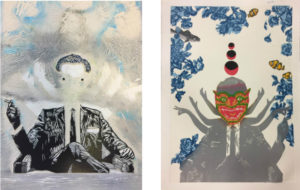
Bow Vacharussiriyuth, reduction linocut in progress, 2016
Print (Re)Generations - FULL
In this course you will explore ways in which contemporary print processes can inform traditional print production and vice versa. Sourced materials/imagery, photographs, historical references and hand drawings will be mediated through Photoshop or collage. You will generate conceptually and visually coherent working drawings, collages and proofs which will, in turn, inform the production of original prints that utilise the reduction linocut processes. Notions of appropriation, quotation, recycling and hybridity will be embedded into explorations of the unique possibilities offered by various print generations. You will also investigate the ongoing dialogues between historical and contemporary methods of print production.
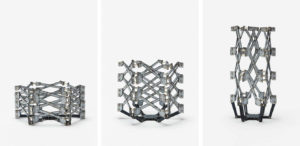
Katie Collins "From the ground up", 2013, Vessel
Mild steel, vitreous enamel, sterling silver, acquired by RMIT University W.E.McMillan collection
Small Object Mechanics
In this workshop students will investigate the notion of the jewellery object mechanism as both concept and process, specifically for the construction of small scale wearable and non wearabale objects. Attachments, articulations and joining methods in metal and alternate materials will be investigated to develop your perceptual, formal and technical abilities when making jewellery and objects with connecting and moving elements.
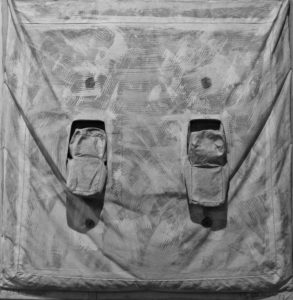
Claes Oldenburg Soft Light Switches, "Ghost" (1929, version1963) (CC BY 2.0) Pedro Ribeiro Simões
Soft Sculpture - FULL
This course focuses on the possibilities of making soft sculpture within a contemporary art framework. Students will undertake a series of short workshops which introduce a variety of conceptual and technical skills including basic pattern making, working with scale, hand and machine sewing, armature construction and the use of readymades. These skills will be contextualized by the works of a range of artists from Louise Bourgeois and Yayoi Kusama to Australian artists Brooke Andrew and Kate Just. Students will develop their own works using a range of pliable materials and are expected to develop new experimental approaches and definitions in the production of soft sculpture.
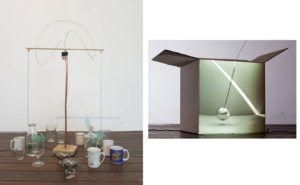
Michael Prior, Elastic Organum, 2014
Sound, Screen and Materiality
In this course you will explore the use of natural, industrial and found materials to create self generating compositions of sound, light and movement. You will explore ways in which the transfer of energy from one form into another may be harnessed into audio-visual compositions. Both live and recording techniques will be explored to capture and present these experiments.
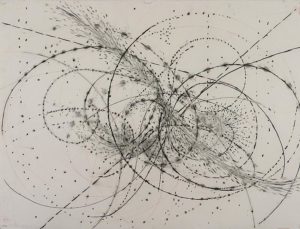
William Kentridge, PREPARING THE FLUTE
(Queen of the Night I), 2005
Temporal Drawing - UNAVAILABLE
Engaging with processes of expanded drawing such as generative drawing, performative drawing and animation, you will explore the use of duration and/or temporality and ways in which mark-making may be understood as a process of change and development over time. Incorporating both collaborative and individual class projects, this course will also be complimented by a range of lectures, demonstrations and group tutorials.
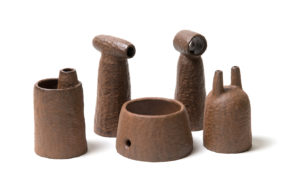
Lucy Mactier, 2016, porcelain
The Functional Object - FULL
The functional object: An investigation into the function of objects and what defines the purpose and how this can take material form. Thinking about ritual, domestic and symbolic concepts, as well as the relationship of tactility, utility and aesthetic, primarily through ceramic making techniques.
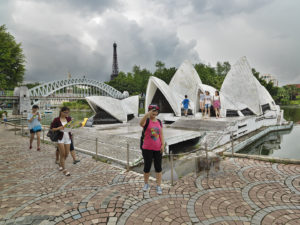
Image Credit: Shane Hulbert, Window of the world, 2014.
The Photographic Fine Print - UNAVAILABLE
In this course you will explore the photographic fine print, its traditions and subsequent practice in the age of digital reproduction. Sophisticated imaging techniques are investigated to expand upon the tradition of the print. You will explore photographic and/or printmaking histories in ways that inform a contemporary digital print imaging practice and employ advanced digital skills and problem solving strategies to make prints of the finest quality.